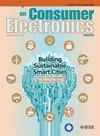基于机器学习的智能相机系统能量优化深度估计
IF 10.9
2区 计算机科学
Q1 ENGINEERING, ELECTRICAL & ELECTRONIC
引用次数: 0
摘要
本文提出了一种用于智能相机系统能量管理的混合方法,该方法将卷积神经网络(cnn)用于深度估计,随机梯度下降(SGD)用于训练,改进粒子群优化(PSO)用于最小化能量消耗。该模型部署cnn来准确预测深度图,而SGD对网络的权重进行微调以提高预测精度。另一方面,改进的粒子群算法优化了相机设置,在不牺牲深度估计性能的情况下实现了节能。改进方法采用交叉和变异算子,提高了算法的全局搜索能力。在KITTI和NYU Depth V2等基准数据集上的实验结果表明,所提出的混合模型可以成功地大幅降低能耗,同时深度精度损失最小。与基线模型的比较表明,能源效率和深度估计精度都有显著提高。本文章由计算机程序翻译,如有差异,请以英文原文为准。
Machine Learning-Based Depth Estimation for Energy Optimization in Smart Camera Systems
This paper presents a hybrid approach for energy management in smart camera systems by combining Convolutional Neural Networks (CNNs) for depth estimation, Stochastic Gradient Descent (SGD) for training, and modified Particle Swarm Optimization (PSO) for minimizing energy consumption. The proposed model deploys CNNs to accurately predict depth maps, while SGD fine-tunes the network’s weights to enhance prediction accuracy. On the other hand, the modified PSO algorithm optimizes camera settings to achieve energy savings without sacrificing depth estimation performance. The modification method consists of crossover and mutation operators to boost the global search ability of the algorithm. Experimental results on benchmark datasets, including KITTI and NYU Depth V2, demonstrate that the proposed hybrid model could successfully make a high reduction in energy consumption, with minimal loss in depth accuracy. Comparisons with baseline models show significant improvements in both energy efficiency and depth estimation precision.
求助全文
通过发布文献求助,成功后即可免费获取论文全文。
去求助
来源期刊
CiteScore
7.70
自引率
9.30%
发文量
59
审稿时长
3.3 months
期刊介绍:
The main focus for the IEEE Transactions on Consumer Electronics is the engineering and research aspects of the theory, design, construction, manufacture or end use of mass market electronics, systems, software and services for consumers.

 求助内容:
求助内容: 应助结果提醒方式:
应助结果提醒方式:


